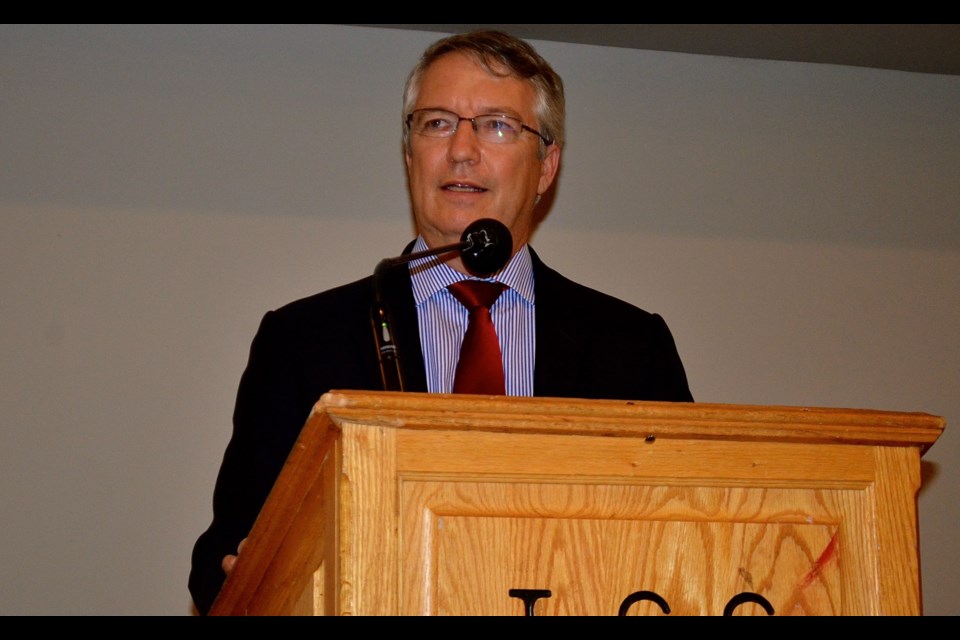A common complaint by those critical of Canada’s immigration and refugee policies is that immigrants take jobs away from people who were born here, but Guelph business owner Jim Estill says that is not the case in Guelph.
“I will tell you right now that there is an unlimited number of blue collar jobs in Guelph,” said Estill. “I get calls and emails everyday from companies that want to hire blue-collar workers.”
Dispelling many of the common myths about immigration was the focus of a panel discussion at the Italian Canadian Club earlier this week.
The event was organized by the office of Guelph MP Lloyd Longfield as part of Citizenship Week.
Longfield reminded the approximately 50 people in attendance that Guelph has benefited from a long history of welcoming immigrants and refugees.
“Look at the Ward here and the Italian immigration that happened many years ago,” said Longfield. “There was another wave of immigration in the 20s and again after the war.
There was also the Hungarian immigration here. Every time there is a crisis in the world Canada gets more people.”
Longfield said that Canada accepts approximately 250,000 immigrants a year and has welcomed more than 1.75 million new citizens over the last 10 years.
“One of the ideas is to get it up to 370,000 a year which is one per cent of Canada’s population but we know we don’t have that capacity built up yet,” said Longfield.
He said he regularly hears concerns from people that immigrants are taking Canadian jobs, that they aren’t contributing to the country and they haven’t paid their dues the way the people born here have.
“Sometimes it is immigrants themselves that are saying, ‘It took me this long to get here and now you are opening the doors to refugees and asylum seekers’,” said Longfield.
“We made a conscious decision to bring in 50,000 refugees from Syria and now we are continuing with somewhere between 15,000 and 20,000 per year from different parts of the world.”
Asylum seekers are not part of any government program and efforts have been made to discourage people from entering the country that way.
“A lot of them are coming up from the United States – about 30 a month are coming in that way,” he said. “It’s an issue we have been dealing with federally and now provincially with the new government of Ontario.”
Panelist Kithio Mwanzia, CEO of the Guelph Chamber of Commerce, talked about his personal story of immigration.
“I immigrated to Canada many years ago as an international student and graduated with a degree in political sciences and a masters in public policy,” he said. “I take interest in this conversation particularly because of the way I came to call Canada home.”
Panelist Tom Lusis works for the economic development department at the County of Wellington but before that he worked for the University of Guelph managing programs for international students.
He said between 60 and 70 per cent of the present 524,000 international students will settle in Canada after graduation. While studying here they will contribute $13 billion to the national GDP and pay $3 million in taxes.
“The work ethic of many of these students can be very humbling,” said Lusis. “In my experience I never had a problem getting them to work a little harder. It was more a matter of reining them in.”
Work ethic has influenced the decision by Cargill to bring in workers from the Philippines and Eritrea to work at their meat processing plants in Guelph and High River Alberta.
“We have two main areas – the harvest area where all the live cattle are processed down to sides and we have the cutting area where we process the sides,” said Cargill HR recruiter Dina Zaki. “Both areas are labour intensive and not a lot of local candidates want to perform labour intensive jobs. They come and try the job for a week or two. If we are lucky maybe a month and that will be it.”
With the approaching retirement wave of baby boomers and slow domestic population growth many see immigration as the best way to fill jobs in a growing economy but that isn’t what motivated Estill to help Syrian refugees settle in Guelph.
“I got involved in the refugee situation as a humanitarian issue,” he said. “I believed it was probably the greatest humanitarian crisis of my lifetime and what could I do to help from a humanitarian point of view.”
Estill was awarded the Order of Canada for his efforts.
“I brought in 61 Syrian refugee families and I am bringing in 26 more refugee families,” he said. “I am trying to bring in non-Arabic speakers because I don’t want Guelph to be an Arabic speaking ghetto where you can live your life only speaking Arabic. Like I said I want people working and speaking English with some degree of integration.”
He offers them temporary work until they are settled and find gainful employment.
“Some people tend to think that refugees are like homeless people,” he said. “Homeless people we will have to support forever. It’s not the same for refugees. We are just helping them through a hard time then they will become productive employees just like everybody else.”